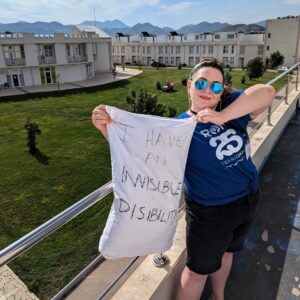Where did you grow up, and what first got you interested in studying theology?
I grew up as a pastor’s kid in California and Oregon, so I guess I’ve been interested in theology my entire life. I first really felt a call to attend seminary during my study abroad while an undergraduate. I was studying International Political Economy at University of Puget Sound, but Augsburg College had an excellent relational study program in Central America that tied together politics and development with religion. After walking in the footsteps of liberation theologists like Oscar Romero—and interacting with both pastors and laypersons who just assumed their faith should influence their thought and actions in the political and social realms—I thought I was meant to be a pastor. Twenty years on, though, I’ve realized my calling lies outside of congregational ministry, and I finally found a fit at Luther Seminary.

What led you to pursue theological education here at Luther Seminary?
The Holy Spirit really wouldn’t leave me alone. But due to a combination of multiple chronic illnesses and my current location—I live in Montenegro with my partner and two cats—I knew an M.Div. wouldn’t be the best fit. When I found out that Luther Seminary had an M.A. in Justice and Reconciliation, I liked the idea of building a theological foundation for future social justice work, because it’s my faith that motivates me to resist injustice and oppression. My dad had completed his Ph.D. at Luther and spoke well of the professors and the rigorous academic standards they’d required, so I decided to apply and continue trying to discern my call while attending school.
What are you hoping to do with your seminary education?
I’m in my final year of the M.A. in Justice and Reconciliation, and I work as a peacebuilder with Peace Catalyst International, an ecumenical Christian organization founded on the belief that working toward justice and reconciliation can move us toward God’s promise of shalom—holistic, sustainable peace that allows all of creation to flourish. My current work with Peace Catalyst involves digital ministry under the banner of “gracefullypunk,” a play on Martin Luther’s “at once sinner and saved” and meant to encourage resistance to oppression through love of all creation.
What is the best part of studying as a distributed learner?
I appreciate that I can take so many classes online at Luther because I live so far away—it also keeps me connected to my culture and my Lutheran-ness. This winter was my first RFS, and I’m sad that it will be my last, because before being at Luther I didn’t realize just how quickly you can form deep connections with your classmates through the intensive sessions.
What’s one thing people don’t know about you?
Most people don’t know that I was writing a book when I started seminary and it was published during my second year. It’s about as far away from theology as possible—More than Maradona: The Life, Death, and Rebirth of Napoli Soccer. Although, I could argue that Napoli, an Italian soccer team, experienced resurrection when the country’s officials killed off the team in 2004 and they rose again shortly after.